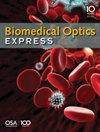HDB-Net:用于病变 OCT 图像视网膜层分割的分层双分支网络。
IF 2.9
2区 医学
Q2 BIOCHEMICAL RESEARCH METHODS
引用次数: 0
摘要
光学相干断层扫描(OCT)视网膜层分割是现代眼科治疗过程中的一个关键步骤,可用于糖尿病黄斑水肿(DME)和多发性硬化(MS)等疾病的诊断和治疗。由于 OCT 图像质量低、视网膜层间形态高度相似以及病变的存在、形状和大小不确定等困难,现有算法的性能并不理想。在这项工作中,我们设计了一种用于病变 OCT 图像视网膜层分割的 HDB-Net 网络,通过结合全局特征和细节特征解决了这一问题。首先,所提出的网络使用 Swin 变换器和 Res50 作为并行主干网络,结合 UperNet 中的金字塔结构,从图像中提取全局上下文并聚合多尺度信息。其次,设计了一个特征聚合模块(FAM),通过引入混合注意力机制,从 Swin 变换器中提取全局上下文信息,从 ResNet 中提取局部特征信息。最后,边界感知和特征增强模块(BA-FEM)用于从浅层的低分辨率特征中提取视网膜层边界信息和拓扑顺序。我们的方法在两个公开数据集上进行了验证,Dice 分数分别为 87.61% 和 92.44,均优于其他最先进的技术。本文章由计算机程序翻译,如有差异,请以英文原文为准。
HDB-Net: hierarchical dual-branch network for retinal layer segmentation in diseased OCT images.
Optical coherence tomography (OCT) retinal layer segmentation is a critical procedure of the modern ophthalmic process, which can be used for diagnosis and treatment of diseases such as diabetic macular edema (DME) and multiple sclerosis (MS). Due to the difficulties of low OCT image quality, highly similar retinal interlayer morphology, and the uncertain presence, shape and size of lesions, the existing algorithms do not perform well. In this work, we design an HDB-Net network for retinal layer segmentation in diseased OCT images, which solves this problem by combining global and detailed features. First, the proposed network uses a Swin transformer and Res50 as a parallel backbone network, combined with the pyramid structure in UperNet, to extract global context and aggregate multi-scale information from images. Secondly, a feature aggregation module (FAM) is designed to extract global context information from the Swin transformer and local feature information from ResNet by introducing mixed attention mechanism. Finally, the boundary awareness and feature enhancement module (BA-FEM) is used to extract the retinal layer boundary information and topological order from the low-resolution features of the shallow layer. Our approach has been validated on two public datasets, and Dice scores were 87.61% and 92.44, respectively, both outperforming other state-of-the-art technologies.
求助全文
通过发布文献求助,成功后即可免费获取论文全文。
去求助
来源期刊

Biomedical optics express
BIOCHEMICAL RESEARCH METHODS-OPTICS
CiteScore
6.80
自引率
11.80%
发文量
633
审稿时长
1 months
期刊介绍:
The journal''s scope encompasses fundamental research, technology development, biomedical studies and clinical applications. BOEx focuses on the leading edge topics in the field, including:
Tissue optics and spectroscopy
Novel microscopies
Optical coherence tomography
Diffuse and fluorescence tomography
Photoacoustic and multimodal imaging
Molecular imaging and therapies
Nanophotonic biosensing
Optical biophysics/photobiology
Microfluidic optical devices
Vision research.
 求助内容:
求助内容: 应助结果提醒方式:
应助结果提醒方式:


